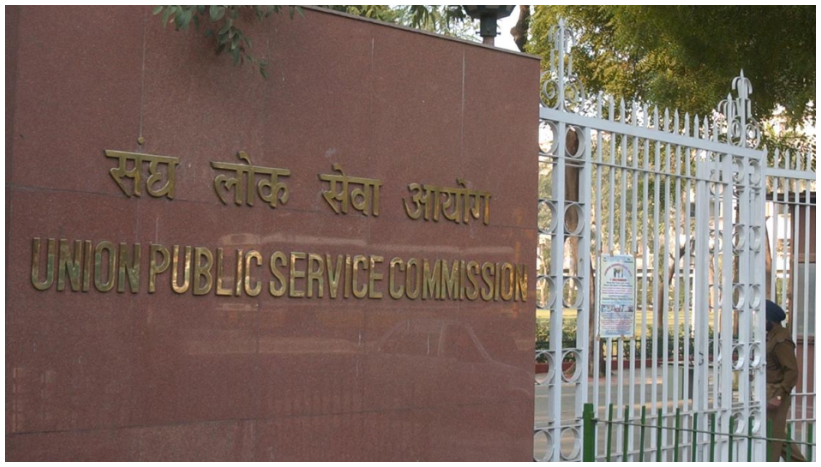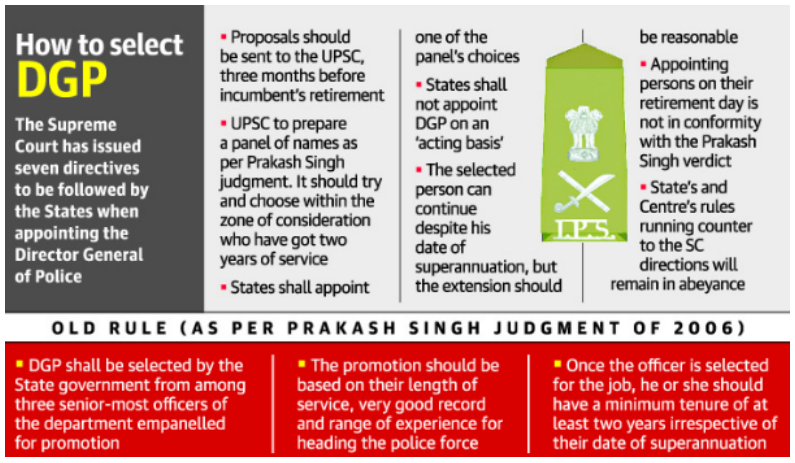- Courses
- GS Full Course 1 Year
- GS Full Course 2 Year
- GS Full Course 3 Year
- GS Full Course Till Selection
- CSAT
- 5 LAYERED ARJUNA Mentorship
- Public Administration Optional
- Online Program
- GS Recorded Course
- NCERT Batch
- Polity Module Course
- Geography Module Course
- Economy Module Course
- AMAC Module Course
- Modern India, Post Independence & World History Module Course
- Environment Module Course
- Governance Module Course
- Science & Tech. Module Course
- International Relations and Internal Security Module Course
- Disaster Management Module Course
- Ethics Module Course
- Essay Module Course
- Current Affairs Module Course
- ABOUT US
- OUR TOPPERS
- TEST SERIES
- FREE STUDY MATERIAL
- VIDEOS
- CONTACT US
Tightening Regulations for Appointing State DGPs
Tightening Regulations for Appointing State DGPs
03-11-2023

Why in News?
Recently, The Union Public Service Commission (UPSC) has released updated guidelines outlining specific requirements for the appointment of State Directors General of Police.

Key Amendments in UPSC Guidelines for DGP Selection
-
Clarity in Selection Norms:
- The UPSC has introduced amendments aimed at enhancing transparency in the selection process for State Directors General of Police (DGPs).
- The guidelines now explicitly outline criteria to prevent favoritism and unfair appointments.
-
Service Tenure Requirement:
- The guidelines require officers with at least six months of service left before retirement to be considered for the State DGP position.
- The move aims to prevent the practice of extending tenures by appointing "favorite officers" near retirement, promoting fair and unbiased selection.
- Several states have appointed retiring DGPs or acting DGPs to avoid the UPSC selection process.
-
Revised Experience Criteria:
- Guidelines have changed the eligibility criteria for the DGP position from 30 years of service to 25 years, expanding the pool of eligible candidates.
-
Limit on Shortlisted Officers:
- The guidelines limit the number of officers shortlisted for the DGP position to three, with exceptions only permitted under specific circumstances.
- The policy emphasizes voluntary participation, requiring officers to express their willingness to be considered for the position.
-
Specified Areas of Expertise:
- The new guidelines outline the essential areas of experience required for an IPS officer to lead a State Police Department.
- requirements for this position require at least ten years of experience in critical areas such as law and order, crime, economic offenses, or intelligence.
- guidelines emphasize the necessity of deputation to central bodies like the Intelligence Bureau, Research and Analysis Wing, or Central Bureau of Investigation.
-
Empanelment Committee's Limits on Assessment:
- UPSC's Empanelment Committee will not evaluate IPS officers for the State DGP position if the Union Ministry of Home Affairs informs the State government that releasing the officers is not feasible.

Supreme Court’s Directives on Police Reforms
- The Prakash Singh Case 2006 led to seven directives by the Supreme Court in India to drive police reforms, addressing issues like politicization, lack of accountability, and systemic weaknesses.
- Establish State Security Commission (SSC) to prevent excessive government influence on the police, establish policy guidelines, and evaluate state police performance.
- The DGP will be appointed through a transparent, merit-based process, with a minimum tenure of two years.
- The UPSC Chairman leads a committee appointing the State DGP, comprising the Union Home Secretary, State's Chief Secretary, DGP, and a Central Armed Police Forces head.
- Policy mandates a minimum two-year tenure for operational police officers, including District Superintendents and Station House Officers.
- Proposed National Security Commission (NSC) aims to establish a union-level panel for selecting and appointing Central Police Organizations' Chiefs, with a minimum two-year tenure requirement.
Must Check: Best IAS Coaching In Delhi



